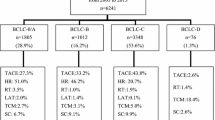Abstract
Although advanced hepatocellular carcinoma (HCC) with extrahepatic metastasis is recommended to be treated by a systemic chemotherapeutic agent without local treatment targeting the liver, studies reported that causes of death in these patients were mostly from progression of intrahepatic lesions. Thus, this study investigated prognosis and factors predicting survival in these patients so as to evaluate the role of local treatments against intrahepatic lesions when the patients already had extrahepatic metastasis. This retrospective study evaluated medical records of 277 patients with HCC and extrahepatic metastasis. The median survival was 5.9 months, and 257 patients died during the follow up. Factors affecting survival of HCC patients with extrahepatic metastasis were poor response to treatment of hepatic lesions (HR 2.207; 95 % CI; p < 0.001), applying local treatment specifically targeting intrahepatic lesions (HR 0.591; 95 % CI 0.436–0.803; p = 0.001), intrahepatic tumor size larger than 3 cm (HR 2.065; 95 % CI 1.444–2.954; p < 0.001), and ECOG performance status 2 or higher (HR 1.543; 95 % CI 1.057–2.253; p = 0.025). The patients with either complete or partial response to the therapy had 1- and 2-year survival rate of 48.8 and 12.1 % whereas patient with either stable or progressive disease had 1-year survival rate of 11.4 %. These results suggest that even in the HCC patients with extrahepatic metastasis, effective local treatment may still be beneficial for the survival especially in patients with acceptable performance status.


Similar content being viewed by others
Abbreviations
- HCC:
-
Hepatocellular carcinoma
- BCLC:
-
Barcelona Clinic Liver Cancer
- RFA:
-
Radiofrequency ablation
- TACE:
-
Transarterial chemoembolization
- CT:
-
Computed tomography
- MRI:
-
Magnetic resonance imaging
- ECOG:
-
Eastern Cooperative Oncology Group
- (m)RECIST:
-
(modified) Response evaluation criteria in solid tumors
- HR:
-
Hazard ratio
- CI:
-
Confidence interval
- CR:
-
Complete response
- PR:
-
Partial response
- SD:
-
Stable disease
- PD:
-
Progressive disease
References
Bruix J, Sherman M (2011) Management of hepatocellular carcinoma: an update. Hepatology 53:1020–1022
Llovet JM, Ricci S, Mazzaferro V et al (2008) Sorafenib in advanced hepatocellular carcinoma. N Engl J Med 359:378–390
Cheng AL, Kang YK, Chen Z et al (2009) Efficacy and safety of sorafenib in patients in the Asia-Pacific region with advanced hepatocellular carcinoma: a phase III randomised, double-blind, placebo-controlled trial. Lancet Oncol 10:25–34
Yoo DJ, Kim KM, Jin YJ et al (2011) Clinical outcome of 251 patients with extrahepatic metastasis at initial diagnosis of hepatocellular carcinoma: does transarterial chemoembolization improve survival in these patients? J Gastroenterol Hepatol 26:145–154
Jung SM, Jang JW, You CR et al (2012) Role of intrahepatic tumor control in the prognosis of patients with hepatocellular carcinoma and extrahepatic metastases. J Gastroenterol Hepatol 27:684–689
Uka K, Aikata H, Takaki S et al (2007) Clinical features and prognosis of patients with extrahepatic metastases from hepatocellular carcinoma. World J Gastroenterol 13:414–420
Uchino K, Tateishi R, Shiina S et al (2011) Hepatocellular carcinoma with extrahepatic metastasis: clinical features and prognostic factors. Cancer 117:4475–4483
Oken MM, Creech RH, Tormey DC et al (1982) Toxicity and response criteria of the Eastern Cooperative Oncology Group. Am J Clin Oncol 5:649–655
Therasse P, Arbuck SG, Eisenhauer EA et al (2000) New guidelines to evaluate the response to treatment in solid tumors. European Organization for Research and Treatment of Cancer, National Cancer Institute of the United States, National Cancer Institute of Canada. J Natl Cancer Inst 92:205–216
Lencioni R, Llovet JM (2010) Modified RECIST (mRECIST) assessment for hepatocellular carcinoma. Semin Liver Dis 30:52–60
Kudo M, Izumi N, Kokudo N et al (2011) Management of hepatocellular carcinoma in Japan: Consensus-Based Clinical Practice Guidelines proposed by the Japan Society of Hepatology (JSH) 2010 updated version. Dig Dis 29:339–364
European Association For The Study Of The L, European Organisation For R, Treatment Of C (2012) EASL-EORTC clinical practice guidelines: management of hepatocellular carcinoma. J Hepatol 56:908–943
Pinter M, Hucke F, Graziadei I et al (2012) Advanced-stage hepatocellular carcinoma: transarterial chemoembolization versus sorafenib. Radiology 263:590–599
Zhao Y, Wang WJ, Guan S et al (2013) Sorafenib combined with transarterial chemoembolization for the treatment of advanced hepatocellular carcinoma: a large-scale multicenter study of 222 patients. Ann Oncol 24:1786–1792
Choi GH, Shim JH, Kim MJ et al (2013) Sorafenib alone versus sorafenib combined with transarterial chemoembolization for advanced-stage hepatocellular carcinoma: results of propensity score analyses. Radiology 269:603–611
Sawada Y, Iwamoto S, Yurino N et al (1991) Rupture of hepatocellular carcinoma with multiple pulmonary metastasis successfully treated by transcatheter arterial embolization (TAE) of tumor: a case report. Gan To Kagaku Ryoho 18:2471–2475
Ohba K, Omagari K, Nakamura T et al (1998) Abscopal regression of hepatocellular carcinoma after radiotherapy for bone metastasis. Gut 43:575–577
Heianna J, Miyauchi T, Suzuki T et al (2007) Spontaneous regression of multiple lung metastases following regression of hepatocellular carcinoma after transcatheter arterial embolization. A case report. Hepatogastroenterology 54:1560–1562
Acknowledgments
This study was supported by Basic Science Research Program through the National Research Foundation of Korea (NRF) funded by the Ministry of Science, ICT and Future Planning (NRF-2013R1A1A3011912).
Conflict of interest
The authors declare that they have no conflict of interest.
Author information
Authors and Affiliations
Corresponding author
Rights and permissions
About this article
Cite this article
Lee, J.I., Kim, J.K., Kim, D.Y. et al. Prognosis of hepatocellular carcinoma patients with extrahepatic metastasis and the controllability of intrahepatic lesions. Clin Exp Metastasis 31, 475–482 (2014). https://doi.org/10.1007/s10585-014-9641-x
Received:
Accepted:
Published:
Issue Date:
DOI: https://doi.org/10.1007/s10585-014-9641-x




